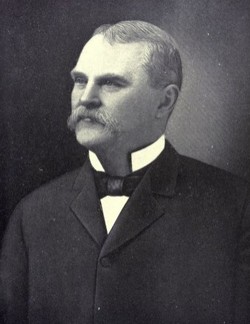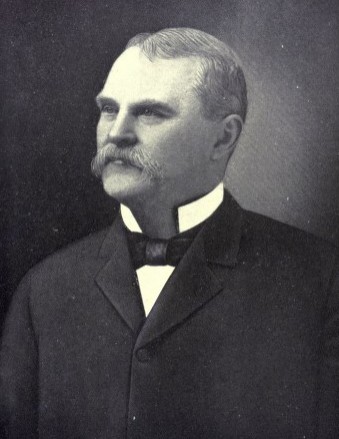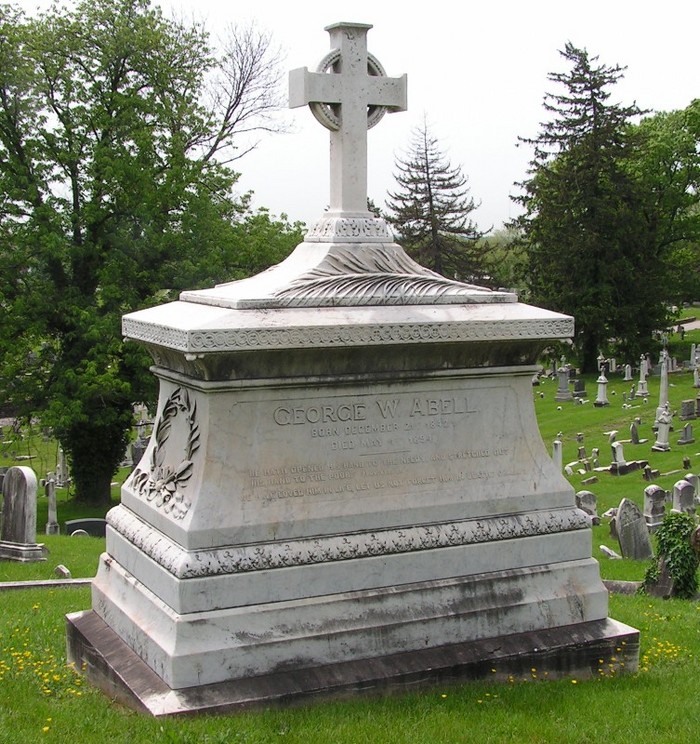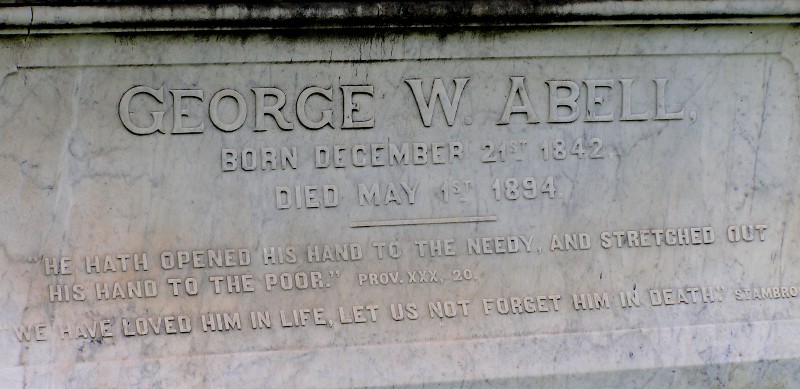is a power to be reckoned with, and the editor's sanctum is the seat of an
authority not inferior to that of kings. The leading journalists of the
United States during the last century were, to a great degree, the arbiters
of our national destiny. Greeley, Raymond, Dana and others, their great
shades emerge from the mists which already begin to envelop the mid-
decades of the nineteenth century. And, although the stirring times which
called forth the powers of these editors of the past have now become matter
of history, the new age has demands of its own, and to meet these demands
men have been raised up whose talents and influence are not inferior to those
of their predecessors. Foremost among these journalists of the recent past
was the late George William Abell, who built up the Baltimore Sun to be one
of the few representative papers of the United States. Mr. Abell has left
a name in his profession greater than even that of his distinguished father,
the founder of the paper, the latter having been more of a business man than
a journalist, while George William Abell is regarded by many as the greatest
newspaper man of his time.
Mr. Abell was born December 21, 1842, in Baltimore. He was the
second son of Arunah Shepherdson and Mary (Fox-Campbell) Abell, and
received his preparatory education at Dalrymple's School, whence he passed
to the University of Maryland, graduating with highest honors, June 21,
1861. He took up the study of law, and on December 17, 1864, was ad-
mitted to the Baltimore bar, but, after spending two years in the office of
Charles J. Gwinn, decided to make journalism rather than law the work of
his life. He therefore entered the counting-room of The Sun, and thence
passed into the news and editorial departments. He was identified with all
the improvements, developments and enterprises of the paper from the time
he entered its service until the day of his death, a period of nearly thirty
years. His legal studies were always of great advantage to him, and for
many years he was his father's confidential attorney. After the death of
Mr. A. S. Abell, and of his third son, Walter R. Abell, the A. S. Abell Com-
pany was incorporated, August 9, 1892, at which time George William Abell
was elected president and manager, which offices he continued to hold for
the remainder of his life.
While sharing fully with his brother, Edwin F. Abell, other serious and
manifold responsibilities pertaining to his father's large estate, the more
active and immediate management of The Sun, by mutual agreement be-
tween the brothers, devolved upon George William Abell. He brought to
his office not only the experience acquired under his father's instruction, but
the most generous enthusiasm and the noblest and loftiest conception of the
mission of a great newspaper, and the duty to the public of the editor and
publisher of such a paper. He upheld the high standard set by his father,
ever excluding from the columns of his journal news of a sensational or
impure character. Realizing the influence and power of The Sun, he held
his high office as a trust, bringing to the discharge of its duties all the results
of his ripe and varied experience and his careful observation, together with
the manifold resources of his cultured and judicial mind, wielding an in-
fluence all the more potent for the reason that it was moral no less than
political, and exercised for the public weal rather than for personal ends.
Mr. Abell was greatly admired and beloved by the men with whom he
was associated in the management of The Sun. Each day he conferred briefly with the_ heads of departments, after which he withdrew from the
office for the day. He had the reputation, well deserved, of transacting an
enormous amount of business in a short time, possessing in an eminent de-
gree that power which is more of a gift than an acquisition, the ability to
do two or three things at once, and do them all well. Not Mr. Abell's
brilliant talents alone, however, but the exceptional generosity and kindliness
of his nature, serve to keep his memory green among those still serving
upon the paper. Many and affectionate are the stories that cluster about
his administration. Said an old compositor of The Sun: "Mr. George
Abell spoke his mind without reserve ; he found fault when there was fault
to find, but he never parted from you without a word of commendation for
some good work you had done, that took all sting from his reproof."
There is a story that Mr. Abell once met in the street, on a cold winter
day, one of the young men employed upon the paper, who, notwithstanding
the weather, had no overcoat. Upon inquiring the cause, he learned that the
lad possessed no such luxury, and he instantly ordered him to a tailor to be
supplied with an overcoat at his employer's expense. Another anecdote
relates how, when a complete edition was hopelessly wrecked between the
composing room and the presses, and the pride of the publishers was deeply
humiliated, Mr. Abell's only question was, "Has anybody been hurt?" When
assured that no one had been injured, he made no further reference to the
mishap.
Mr. Abell was a loyal and loving son to Baltimore and to Maryland,
having deeply at heart what he conceived to be the best interests of both.
His opinions might differ from those of others, but the very earnestness with
which he defended his own views proceeded from the sincerity of his convic-
tion that they were right. He was absolutely without malice or any feeling
of personal hostility toward those from whom he differed, and whose con-
duct in public affairs he felt it his duty to criticise and oppose. He was dis-
tinguished throughout his career for public spirit, devotion to principle,
courage and unselfishness; It was in consequence of his liberal disposition
and at his suggestion that "The Sun Almanac" was first issued in 1876, and
he encouraged and stimulated every step in its subsequent publication,
realizing that it was an exceedingly useful and practical compilation, and
satisfied a public want. It was his desire to make the book not merely a
chronicle of the year, but, through its agency, to foster interest in and
appreciation of the history of the State, and to make widely known the
varied resources and advantages of Maryland.
Mr. Abell married, November 29, 1871, Jane Frances, daughter of the
late George W. Webb, and three children were born to them : Charles
Shepherdson ; Jennie M., wife of Francis Theodore Homer, of Baltimore ;
and Annie, who died in childhood.
In addition to his town house, Mr. Abell was the owner of a country
residence, built shortly before his death, at Sherwood, Maryland, and called
"The Ridge." He was of a strongly domestic nature, devoted to his home
and family, and in disposition singularly unassuming, content to do good
without claiming or receiving the credit of his kindly acts. He shrank from
praise which most men would have coveted, and in all his actions in refer-
ence to public affairs, as well as in his many private charities, his chief
desire was that his left hand should not know the good his right hand was
doing. His happiness seemed to consist in making others happy. In appear-
ance Mr. Abell was an exceptionally handsome man, of Saxon type, blue
eyes, fair hair and ruddy complexion with a bearing of singular distinction,
and manners at once affable and dignified. In all his personal relations he was loyalty itself, betraying no trust that was ever reposed in him, and the
number of his friends was legion.
In 1888 Mr. Abell visited Europe with his family, and was to have gone
abroad again three days before his death, which occurred after a brief illness,
May i, 1894, at his home in Baltimore. The removal of this gifted and
lovable man while in the prime of life was mourned with the deepest sincerity
by both high and low. It is not a matter of marvel that his memory is en-
shrined in the hearts of all who knew him, and remains as a blessed benedic-
tion to those who were his friends and associates while he was still an active
factor in the affairs of the world.
The loss which Baltimore sustained by the removal of such a man is
well-nigh incalculable. But his "works follow him." A monument reared
by his own genius commemorates him, the great journal of which he was,
for so many years, the heart and soul, which he might almost be said to have
created still addresses its vast and constantly increasing audiences. "The
pen is mightier than the sword." If any doubt this, let him consider the life
and work of George William Abell.
[bio from "Baltimore; its history and its people, Vol. 2" (1912)]
is a power to be reckoned with, and the editor's sanctum is the seat of an
authority not inferior to that of kings. The leading journalists of the
United States during the last century were, to a great degree, the arbiters
of our national destiny. Greeley, Raymond, Dana and others, their great
shades emerge from the mists which already begin to envelop the mid-
decades of the nineteenth century. And, although the stirring times which
called forth the powers of these editors of the past have now become matter
of history, the new age has demands of its own, and to meet these demands
men have been raised up whose talents and influence are not inferior to those
of their predecessors. Foremost among these journalists of the recent past
was the late George William Abell, who built up the Baltimore Sun to be one
of the few representative papers of the United States. Mr. Abell has left
a name in his profession greater than even that of his distinguished father,
the founder of the paper, the latter having been more of a business man than
a journalist, while George William Abell is regarded by many as the greatest
newspaper man of his time.
Mr. Abell was born December 21, 1842, in Baltimore. He was the
second son of Arunah Shepherdson and Mary (Fox-Campbell) Abell, and
received his preparatory education at Dalrymple's School, whence he passed
to the University of Maryland, graduating with highest honors, June 21,
1861. He took up the study of law, and on December 17, 1864, was ad-
mitted to the Baltimore bar, but, after spending two years in the office of
Charles J. Gwinn, decided to make journalism rather than law the work of
his life. He therefore entered the counting-room of The Sun, and thence
passed into the news and editorial departments. He was identified with all
the improvements, developments and enterprises of the paper from the time
he entered its service until the day of his death, a period of nearly thirty
years. His legal studies were always of great advantage to him, and for
many years he was his father's confidential attorney. After the death of
Mr. A. S. Abell, and of his third son, Walter R. Abell, the A. S. Abell Com-
pany was incorporated, August 9, 1892, at which time George William Abell
was elected president and manager, which offices he continued to hold for
the remainder of his life.
While sharing fully with his brother, Edwin F. Abell, other serious and
manifold responsibilities pertaining to his father's large estate, the more
active and immediate management of The Sun, by mutual agreement be-
tween the brothers, devolved upon George William Abell. He brought to
his office not only the experience acquired under his father's instruction, but
the most generous enthusiasm and the noblest and loftiest conception of the
mission of a great newspaper, and the duty to the public of the editor and
publisher of such a paper. He upheld the high standard set by his father,
ever excluding from the columns of his journal news of a sensational or
impure character. Realizing the influence and power of The Sun, he held
his high office as a trust, bringing to the discharge of its duties all the results
of his ripe and varied experience and his careful observation, together with
the manifold resources of his cultured and judicial mind, wielding an in-
fluence all the more potent for the reason that it was moral no less than
political, and exercised for the public weal rather than for personal ends.
Mr. Abell was greatly admired and beloved by the men with whom he
was associated in the management of The Sun. Each day he conferred briefly with the_ heads of departments, after which he withdrew from the
office for the day. He had the reputation, well deserved, of transacting an
enormous amount of business in a short time, possessing in an eminent de-
gree that power which is more of a gift than an acquisition, the ability to
do two or three things at once, and do them all well. Not Mr. Abell's
brilliant talents alone, however, but the exceptional generosity and kindliness
of his nature, serve to keep his memory green among those still serving
upon the paper. Many and affectionate are the stories that cluster about
his administration. Said an old compositor of The Sun: "Mr. George
Abell spoke his mind without reserve ; he found fault when there was fault
to find, but he never parted from you without a word of commendation for
some good work you had done, that took all sting from his reproof."
There is a story that Mr. Abell once met in the street, on a cold winter
day, one of the young men employed upon the paper, who, notwithstanding
the weather, had no overcoat. Upon inquiring the cause, he learned that the
lad possessed no such luxury, and he instantly ordered him to a tailor to be
supplied with an overcoat at his employer's expense. Another anecdote
relates how, when a complete edition was hopelessly wrecked between the
composing room and the presses, and the pride of the publishers was deeply
humiliated, Mr. Abell's only question was, "Has anybody been hurt?" When
assured that no one had been injured, he made no further reference to the
mishap.
Mr. Abell was a loyal and loving son to Baltimore and to Maryland,
having deeply at heart what he conceived to be the best interests of both.
His opinions might differ from those of others, but the very earnestness with
which he defended his own views proceeded from the sincerity of his convic-
tion that they were right. He was absolutely without malice or any feeling
of personal hostility toward those from whom he differed, and whose con-
duct in public affairs he felt it his duty to criticise and oppose. He was dis-
tinguished throughout his career for public spirit, devotion to principle,
courage and unselfishness; It was in consequence of his liberal disposition
and at his suggestion that "The Sun Almanac" was first issued in 1876, and
he encouraged and stimulated every step in its subsequent publication,
realizing that it was an exceedingly useful and practical compilation, and
satisfied a public want. It was his desire to make the book not merely a
chronicle of the year, but, through its agency, to foster interest in and
appreciation of the history of the State, and to make widely known the
varied resources and advantages of Maryland.
Mr. Abell married, November 29, 1871, Jane Frances, daughter of the
late George W. Webb, and three children were born to them : Charles
Shepherdson ; Jennie M., wife of Francis Theodore Homer, of Baltimore ;
and Annie, who died in childhood.
In addition to his town house, Mr. Abell was the owner of a country
residence, built shortly before his death, at Sherwood, Maryland, and called
"The Ridge." He was of a strongly domestic nature, devoted to his home
and family, and in disposition singularly unassuming, content to do good
without claiming or receiving the credit of his kindly acts. He shrank from
praise which most men would have coveted, and in all his actions in refer-
ence to public affairs, as well as in his many private charities, his chief
desire was that his left hand should not know the good his right hand was
doing. His happiness seemed to consist in making others happy. In appear-
ance Mr. Abell was an exceptionally handsome man, of Saxon type, blue
eyes, fair hair and ruddy complexion with a bearing of singular distinction,
and manners at once affable and dignified. In all his personal relations he was loyalty itself, betraying no trust that was ever reposed in him, and the
number of his friends was legion.
In 1888 Mr. Abell visited Europe with his family, and was to have gone
abroad again three days before his death, which occurred after a brief illness,
May i, 1894, at his home in Baltimore. The removal of this gifted and
lovable man while in the prime of life was mourned with the deepest sincerity
by both high and low. It is not a matter of marvel that his memory is en-
shrined in the hearts of all who knew him, and remains as a blessed benedic-
tion to those who were his friends and associates while he was still an active
factor in the affairs of the world.
The loss which Baltimore sustained by the removal of such a man is
well-nigh incalculable. But his "works follow him." A monument reared
by his own genius commemorates him, the great journal of which he was,
for so many years, the heart and soul, which he might almost be said to have
created still addresses its vast and constantly increasing audiences. "The
pen is mightier than the sword." If any doubt this, let him consider the life
and work of George William Abell.
[bio from "Baltimore; its history and its people, Vol. 2" (1912)]
Inscription
"We have loved him in life, let us not forget him in death." - St. Ambrose
Family Members
Advertisement
Advertisement
















